


Someone Else's Words
Syd's Fractured Fairy Tales
The real story behind "Matilda Mother"
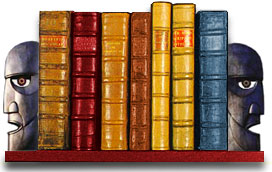
In this issue of Spare Bricks, we proudly unveil a new column, entitled "Someone Else's Words", in which we will examine a variety of literary works (fiction, philosophy, history, comic books, etc.) that have influenced the music of Pink Floyd and its members. We plan on drawing from as many different writers and genres as possible, and will feature an assortment of regular staffers and guest contributors. If you have suggestions for future columns, or would like to contribute, please contact the Spare Bricks staff. --The Editor.
There was a king who ruled the land
His majesty was in command
With silver eyes the scarlet eagle
Showered silver on the people
Oh, Oh Mother, tell me more
Why'd you have to leave me there
Hanging...
And so begin the familiar lyrics to "Matilda Mother", a Syd Barrett composition that appeared on Pink Floyd's first LP, The Piper at the Gates of Dawn (released August 5, 1967). The song paints a delightful image of a little girl being read a bedtime story. The odd thing is that the lyrics make no mention of her. Are we to assume that this little girl is Matilda? Is it Matilda that requests, "tell me more"? Or is there something more mysterious afoot?
Indeed, there is a mystery. The little girl is not Matilda. And the Mother reading the fairy stories is not her mother. This we know because Matilda lived with her Aunt, not her mother.
What!?!?
Well you see, the above lyrics are not actually the lyrics Syd originally intended! They are but a figment of Syd's duressed imagination. They are not the "real" lyrics to "Matilda Mother". These familiar words should never have been written. The fact is, there was an original set of lyrics, and Syd was forced to change them at the last minute.
"Matilda Mother", as it appears on Piper, was recorded at Abbey Road on June 7, 1967. Prior to that, "Matilda Mother" had a completely different set of lyrics, taken from a collection of humorous "children's" stories in which bad boys and girls get killed at the end of each story. (You can imagine why this might appeal to Syd.)
After no small effort, I have successfully transcribed the original lyrics. So for the first time ever published, I give to you the original lyrics of "Matilda Mother":
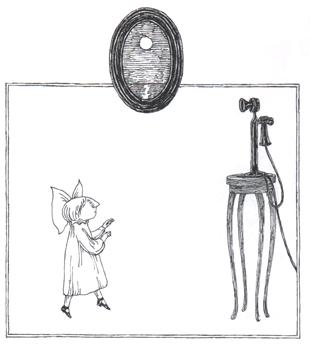 Matilda tiptoes to the telephone, in this illustration by Edward Gorey. |
Matilda told such dreadful lies
It made one gasp and stretch one's eyes
Her Aunt, who from her earliest youth
Had kept a strict regard for truth
Oh what a drag
Out with a bang
Finding she was left alone
Went tiptoe to the telephone -- Ringing!
Summoned the immediate aid
Of London's Noble Fire Brigade
There was a boy whose name was Jim
His friends, they were very good to him
They gave him tea, and cakes and jam
And slices of delicious ham
Oh what a drag
Out with a bang
Finding she was left alone
Went tiptoe to the telephone -- Ringing!
Summoned the immediate aid
Of London's Noble Fire Brigade
The chief defect of Henry King
Was chewing little bits of string
At last he swallowed some which tied
Itself in ugly knots inside
Oh what a drag
Out with a bang
Finding she was left alone
Went tiptoe to the telephone -- Ringing!
Summoned the immediate aid
Of London's Noble Fire Brigade
It's well known that Syd Barrett was fond of fairy tales and children's stories. This song is a testament to that fact. Syd had written this song, and the Pink Floyd were performing it live, long before they turned professional on February 1, 1967.
In 1966, without the burden of a recording contract, Syd had had the liberty to develop lyrics for his songs in any manner he chose, including plagiarism. Syd had lifted these lyrics for "Matilda Mother" directly from the pages the book, Cautionary Tales for Children: Designed for the Admonition of Children Between the Ages of Eight and Fourteen Years: Verses by Hilaire Belloc.
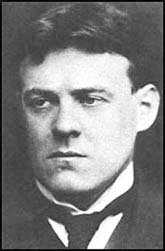 Hilaire Belloc |
Belloc's book consists of several stories of nasty things happening to children who do things they ought not to do. In the first three stories, which are about Jim, Henry, and Matilda, each child pays the ultimate price for his/her misdeeds. In the most of the remaining stories, the outcome is not nearly so grim.
It is from the story of Matilda, who told lies and was burned to death, that Syd lifted the lyrics for the first verse, the chorus, and half of the title. It is from the story of Jim, who ran away from his nurse and was eaten by a lion, that Syd lifted the lyrics for the second verse. It is from the story of Henry King, who chewed bits of string and was early cut off in dreadful agonies that Syd lifted the lyrics for the final verse. (The complete texts of the three original poems are included below.)
The only original lyrics written by Syd himself are his commentary on the matter in the refrain, "oh what a drag, out with a bang."
Born in France in 1870, Hilaire Belloc was educated in England and became a British citizen in 1902. He was a prolific writer, creating over 150 volumes on very diverse subject matters. As a member of the socialist Fabian Society, Belloc was friends with noted writers George Bernard Shaw and H. G. Wells. He was elected to the House of Commons in 1906, but in 1910 the voters returned him to life as a journalist. Belloc wrote for Land and Water, a weekly periodical that covered events of World War I. Cautionary Tales for Children, his third book of children's poetry, was first published in 1907. Hilaire Belloc died in 1953, lingering for 11 years after a debilitating stroke in 1942.
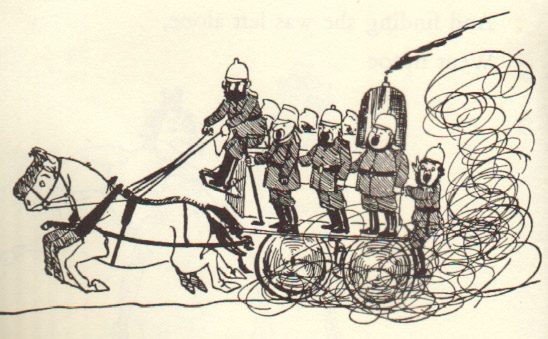 London's Noble Fire Brigade, as illustrated by Basil T. Blackwood in the original edition of Belloc's Cautionary Tales. These illustrations are likely the ones with which Syd Barrett would have been familiar. |
The original version of the book included illustrations by Basil T. Blackwood. Although crude by today's standards, Lord Blackwood's drawings helped those young readers nearly a century ago to understand that the out-of-proportion punishments were not to be taken seriously. Blackwood also illustrated Belloc's two earlier children's books, The Bad Child's Book of Beasts (published in 1896) and More Beasts (For Worse Children) (published in 1897). Lord Blackwood was killed in action in 1917.
Cautionary Tales for Children was very popular, and still is today. It was a very refreshing change to the dull and boring verses available to children at the beginning of the twentieth century. Actually, Belloc's work deliberately mocks the pedantic style of children's poetry used by his contemporaries. Cautionary Tales for Children has undergone numerous printings over the years, the most recent version featuring new illustrations by Edward Gorey.
After the Pink Floyd earned their recording contract with EMI, the Belloc estate was approached in order to obtain the rights to use these lyrics in their upcoming debut album. Anticipating approval, the band recorded "Matilda Mother" on February 21, 1967, using the lyrics lifted from Belloc's work. Unfortunately, the request was eventually denied, thereby leaving Syd with some last minute lyrical tinkering to do.
(Special thanks go to David Parker, through whom I was able to get confirmation directly from Andrew King that the Pink Floyd did indeed record "Matilda Mother" using Belloc's lyrics and only later were they redone when the Belloc estate would not clear their use.)
Norman Smith, the EMI producer working with the Floyd, provided some additional tinkering to "Matilda Mother". On June 29, 1967, after all the recording sessions were completed, he decided that the instrumental section on "Matilda Mother" was too long. He literally cut the tape into three pieces. The first and third pieces were then glued together to create what you hear on the album. This transition between "Matilda Mother" (as the first piece of tape was labeled) and "Sunshine" (as the third piece of tape was labeled) is a little awkward. If you listen for it, you can hear the cut in that microsecond before the third verse starts. The label, "Sunshine", just happened to be a convenient lyrical reference point. (You can hear the vocal "Sunshiiiiine!" in the left channel as the lead vocal goes "For all the time spent in that room", predominantly in the right channel.) "Wondering and Dreaming", as the second piece was labeled, consists of the approximately 50 seconds of instrumental that Smith had successfully removed from the song. (The original February recording had a runtime of 3:55, while the released version clocks in at just 3:06.)
 The Pink Floyd perform at UFO in January 1967, as captured by Granada TV. |
Although that early recording is locked firmly away in the EMI vault, do not despair. Syd's original work is not lost to us: a live recording does exist. Granada TV recorded the Pink Floyd live at the UFO club on January 20, 1967. (Other sources indicate the date of the performance filmed as January 27, 1967.) Granada TV used bits of this show in their documentary on the International Times and the London "Underground" scene. According to the Granada archive, this program was first broadcast on March 8, 1967. The full 30-minute film is in collectors' hands. In it, Pink Floyd are seen playing "Matilda Mother" and "Interstellar Overdrive".
You can also look for this recording on the On the Air bootleg. The recording of "Matilda Mother" on On the Air begins with "cakes and jam" at line three of the second verse, while in the film, the recording is slightly longer, beginning with "His friends" line two of that verse. Since the first verse is missing from the Granada TV broadcast, I have reconstructed the above lyrics using logic, deductive reasoning, and a copy of Belloc's text. Therefore, I cannot guarantee its accuracy.
Instead of a song about a mother with no mention of Matilda, we have a song about Matilda with no mention of a mother. I suspect that the 'Mother' reference in the title is a parody of Mother Goose, just as Cautionary Tales is likewise a parody of the standard fare of goody-good children's stories.
So the next time you listen to the familiar lyrics to "Matilda Mother", think Belloc, and consider that Syd's new version might have been called "Matilda, whose constant pestering for more left her with a noose about the neck".
Matilda,
Who told lies, and was Burned to Death
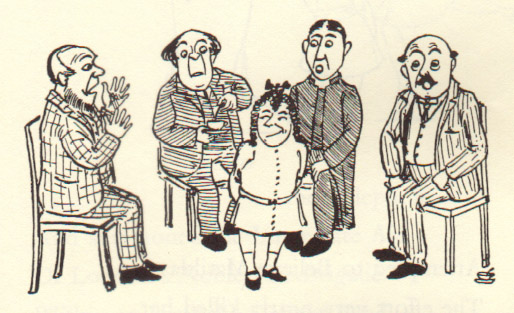 illustration by Basil T. Blackwood |
Matilda told such Dreadful Lies,
It made one Gasp and Stretch one's Eyes;
Her Aunt, who, from her Earliest Youth,
Had kept a Strict Regard for Truth,
Attempted to Believe Matilda:
The effort very nearly killed her,
And would have done so, had not She
Discovered this Infirmity.
For once, towards the Close of Day,
Matilda, growing tired of play,
And finding she was left alone,
Went tiptoe to the Telephone
And summoned the Immediate Aid
Of London's Noble Fire-Brigade.
Within an hour the Gallant Band
Was pouring in on every hand,
From Putney, Hackney Downs, and Bow,
With Courage high and Hearts a-glow
They galloped, roaring through the Town,
"Matilda's House is Burning Down!"
Inspired by British Cheers and Loud
Proceeding from the Frenzied Crowd,
They ran their ladders through a score
Of windows on the Ball Room Floor;
And took Peculiar Pains to Souse
The Pictures up and down the House
Until Matilda's Aunt succeeded
In showing them they were not needed;
And even then she had to pay
To get the Men to go away!
It happened that a few Weeks later
Her Aunt was off to the Theatre
To see that Interesting Play
The Second Mrs. Tanqueray.
She had refused to take her Niece
To hear this Entertaining Piece:
A Deprivation Just and Wise
To Punish her for Telling Lies.
That Night a Fire did break out--
You should have heard Matilda Shout!
You should have heard her Scream and Bawl,
And throw the window up and call
To People passing in the Street--
(The rapidly increasing Heat
Encouraged her to obtain
Their confidence)-- but all in vain!
For every time She shouted "Fire!"
They only answered "Little Liar!"
And therefore when her Aunt returned,
Matilda, and the House, were burned.
Jim,
Who ran away from his Nurse, and was eaten by a Lion.
There was a Boy whose name was Jim;
His Friends were very good to him.
They gave him Tea, and Cakes, and Jam,
And slices of delicious Ham,
And Chocolate with pink inside,
And little Tricycles to ride,
And read him Stories through and through,
And even took him to the Zoo--
But there it was the dreadful Fate
Befell him, which I now relate.
You know--at least you ought to know,
For I have often told you so--
That Children never are allowed
To leave their Nurses in a Crowd;
Now this was Jim's especial Foible,
He ran away when he was able,
And on this inauspicious day
He slipped his hand and ran away!
He hadn't gone a yard when--Bang!
With open Jaws, a Lion sprang,
And hungrily began to eat
The Boy: beginning at his feet.
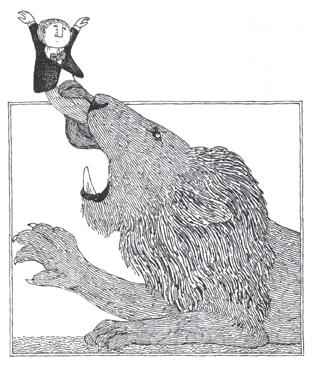 illustration by Edward Gorey |
Now, just imagine how it feels
When first your toes and then your heels,
And then by gradual degrees,
Your shins and ankles, calves and knees,
Are slowly eaten, bit by bit.
No wonder Jim detested it!
No wonder that he shouted "Hi!"
The Honest Keeper heard his cry,
Though very fat he almost ran
To help the little gentleman.
"Ponto!" he ordered as he came
(For Ponto was the Lion's name),
"Ponto!" he cried, with angry Frown.
"Let go, Sir! Down, Sir! Put it down!"
The Lion made a sudden Stop,
He let the Dainty Morsel drop,
And slunk reluctant back to his Cage,
Snarling with Disappointed Rage.
But when he bent over Jim,
The Honest Keeper's Eyes were dim.
The Lion having reached his Head,
The Miserable Boy was dead!
When Nurse informed his Parents, they
Were more Concerned than I can say.
His Mother, as She dried her eyes,
Said, "Well--it gives me no surprise,
He would not do as he was told!"
His Father, who was self-controlled,
Bade all the children round attend
To James's miserable end,
And always keep a-hold of Nurse
For fear of finding something worse.
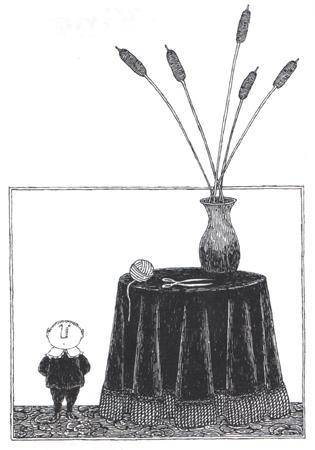 illustration by Edward Gorey |
Henry King,
Who chewed bits of String, and was early cut off in Dreadful Agonies.
The Chief Defect of Henry King
Was chewing little bits of String.
At last he swallowed some which tied
Itself in ugly Knots inside.
Physicians of the Utmost Fame
Were called at once; but when they came
They answered, as they took their Fees,
"There is no Cure for this Disease.
Henry will very soon be dead."
His Parents stood about his Bed
Lamenting his Untimely Death,
When Henry, with his Latest Breath,
Cried--"Oh, my Friends, be warned by me,
That Breakfast, Dinner, Lunch, and Tea
Are all the Human Frame requires..."
With that, the Wretched Child expires.